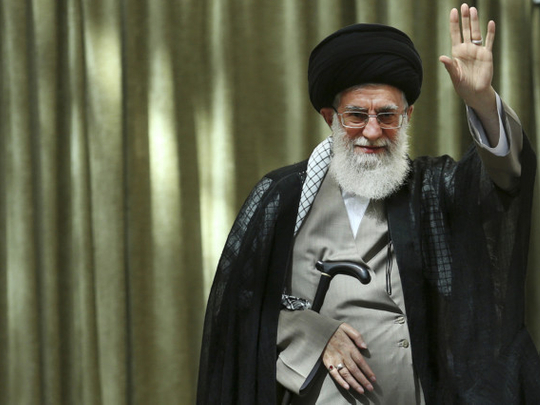
Tehran: Iran’s supreme leader underwent prostate surgery on Monday at a government hospital in Tehran, state media said in a rare report on the state of health of the country’s top cleric.
The 75-year-old Ayatollah Ali Khamenei, who has final say on all state matters in Iran and has been the country’s top leader since 1989, was reported to be recovering.
The official IRNA news agency said the operation, which was described as “routine,” was successful. There were no immediate details on what had prompted the surgery or the underlying medical condition.
Iranian state TV said that Khamenei told the station just ahead of the surgery that there was “no room for concern” and that it was a routine operation. The TV aired a brief footage of Khamenei just ahead of the surgery in which he asked people to pray for him.
“There is no room for concern, but this does not mean that they - the people - do not need to pray,” Khamenei said.
Khamenei was a close ally of the late Ayatollah Ruhollah Khomenei who led the 1979 Islamic Revolution and was later Iran’s supreme leader until his death in 1989.
Khamenei served as Iran’s president for eight years before becoming the supreme leader in 1989. He has proved a powerful defender of the rule by clerics created by his predecessor.
He thwarted the movement in support of a reformist presidential candidate, Mir Hossein Mousavi, in 2009, and when hundreds of thousands of Iranians rose up around the country marching in the streets, some overtly denouncing him, he stepped forward to crush the protests.
Khamenei has kept Iran on a firmly anti-US path, pushing ahead with its nuclear ambitions despite international pressure and sanctions. At the same time, Iran has sought to extend its influence in the Middle East through its ally Syria and Islamic militant groups despite attempt by US-backed Arab governments to contain Iran.
More recently, Khamenei has lent support to the talks between Iran and the six world powers on the country’s controversial nuclear program and the breakthrough interim agreement those talks produced last November.
But Khamenei has also expressed doubts the talks will lead anywhere. Last month, Khamenei said the United States had only grown more hostile to Iran since the talks began, and that there was no point in holding direct negotiations with Washington.
The UN’s nuclear agency is trying to investigate allegations that Iran secretly worked on nuclear weapons - something Tehran denies, insisting its nuclear program is for peaceful purposes only, such as power generation and cancer treatment.
Khamenei has backed Iran’s new President Hassan Rouhani, who took office in August 2013, and Rouhani’s efforts to stabilize the national currency and halt inflation.
But the government has a long way to go to deliver on promises of economic growth.
Khamenei earlier this year said the priority for Iranians is to make their economy immune to outside pressures. He has called UN and Western sanctions imposed over Iran’s nuclear program a “full-fledged economic war” on his country and has ordered the government to create an “economy of resistance” to counter the measures.
The project involves efforts to diversify Iran’s exports, reduce dependence on sales of raw materials and promote knowledge-based high-tech industries.
“If a nation is not strong, the world’s extortionists will extort from it, insult it and if they can, they will trample on it,” Khamenei said in March, in his annual speech for the Persian New Year, Nowruz. “If a nation doesn’t become strong, it will be bullied by others.”












